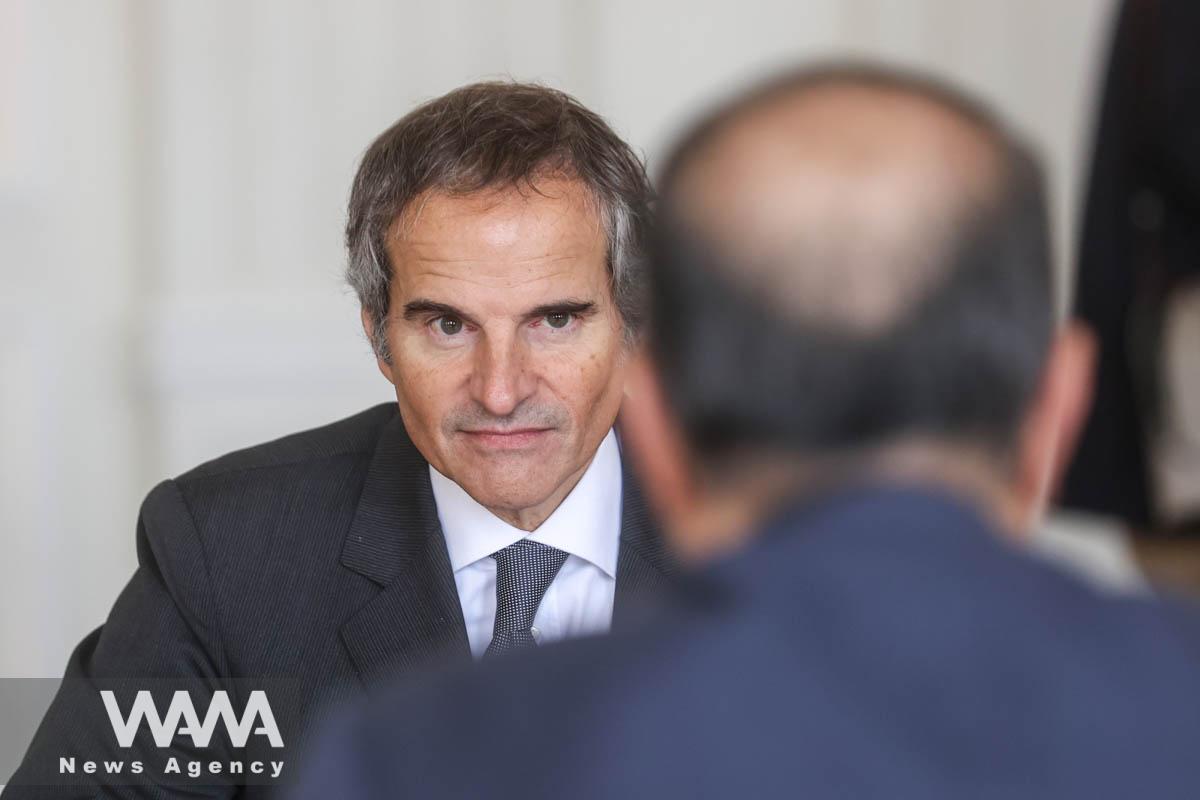Eslami: We Will Respond Immediately to Any Resolution Issuance / Grossi: Attacking Nuclear Facilities is Illegal
WANA (Nov 14) – At a joint press conference with the Director-General of the International Atomic Energy Agency (IAEA), the Head of Iran’s Atomic Energy Organization warned against European countries’ efforts to pass an anti-Iranian resolution at the IAEA’s Board of Governors.
On Thursday, Mohammad Eslami, Head of Iran’s Atomic Energy Organization, and Rafael Grossi, Director-General of the IAEA, held a joint press conference in Tehran following their discussions.
Eslami began by stating that Iran’s interactions with the IAEA, within the framework of safeguards and the Non-Proliferation Treaty (NPT), have been continuous. He emphasized Iran’s commitment to this interaction, noting that communication and exchanges with Mr. Grossi have always been effective and constructive, and that their talks today were similarly productive. The meeting with Mr. Grossi comes at a critical time, as the Western powers continue their unconditional support for the war crimes and genocide carried out by the Zionist regime.
Highlighting the significance of these talks, Eslami criticized the actions of the Israeli regime in undermining the credibility of international institutions. He called on the United Nations and its affiliated organizations to fulfill their responsibilities in preventing the issuance of resolutions that could negatively impact relations between Iran and the IAEA.

Important Talks Between Araqchi and Grossi on Iran’s Nuclear Program
WANA (Nov 14) – This morning, Abbas Araqchi, Iran’s Deputy Foreign Minister, and Rafael Grossi, Director General of the International Atomic Energy Agency (IAEA), held significant discussions regarding Iran’s nuclear program. Baghaei, spokesperson for Iran’s Foreign Ministry, announced the news, stating: “These discussions are part of Iran’s ongoing cooperation with the IAEA to clear […]
Eslami reiterated that any interference in Iran’s nuclear affairs would certainly be met with an immediate and reciprocal response from Iran. He further emphasized that Iran’s peaceful nuclear program is not subject to external pressures and will continue within the framework of national interests.
Eslami stated that any resolution against Iran’s nuclear program gives Iran the right to take reciprocal action.
An Important Visit Amid Complex Conditions
Grossi expressed his satisfaction at being in Tehran, describing this visit as crucial during challenging times. He emphasized the significance of his mission amid regional and global tensions and expressed hope for a successful outcome to this trip.
Grossi stated that the IAEA and Iran have a long-standing working relationship, with ongoing discussions with the head of Iran’s Atomic Energy Organization. This is an important juncture, he said, where we need to reach a concrete and actionable outcome to show the world that our joint efforts are yielding results and leading us away from a confrontational path.

Will the Knot in Iran and the IAEA’s Relations be Untied?
WANA (Nov 14) – Amid a period of considerable ups and downs in the past six months between Iran and the International Atomic Energy Agency (IAEA), Rafael Grossi’s trip to Tehran, as the director general of the IAEA, carries substantial significance. This visit has the potential not only to impact bilateral relations but also to […]
Progress in Iran’s Nuclear Industry Benefits the Iranian People, the Region, and Perhaps the International Community
Eslami noted that two years ago, the Islamic Republic of Iran began a comprehensive program to develop its nuclear industry, aiming to bring the benefits of nuclear technology, particularly in healthcare and food security, into people’s daily lives.
The Deputy President of Iran also noted that the IAEA has consistently supported these programs, which have established a significant industrial and service sector in Iran. He pointed out that soon-to-be-completed projects would benefit the public and also provide useful capacities for the IAEA.
Grossi, referring to his recent visit to Isfahan, where he attended a nuclear science and technology exhibition in May, noted Iran’s significant steps forward in this field, emphasizing that these advancements benefit not only the Iranian people but also the region and possibly the international community.
Transparency is Key
Responding to a question regarding concerns about continued verification information related to safeguards, Grossi stated that transparency and accountability are essential in this field. He agreed with the need to further strengthen IAEA cooperation with Iran, noting that, as we progress on safeguard issues, cooperation in other areas will certainly increase.

Revisiting the Nuclear Fatwa of Iran’s Supreme Leader: Change or Adaptation?
WANA (Nov 09) – The issue of nuclear weapons and the stance of the Islamic Republic of Iran on this subject remains one of the most contentious topics in international politics. A key element of Iran’s policy is rooted in a fatwa (religious decree) by Supreme Leader Ayatollah Khamenei, which prohibits the use and development […]
Nuclear Issues as a Pretext for Severe Sanctions on Iran
Eslami explained that the unique treatment of Iran in nuclear matters has been used as a pretext for severe sanctions, which, according to the West, are “crippling.” He noted that under these sanctions, countries able to cooperate with Iran refrain from doing so. However, Iran has elevated itself to this level through indigenous research.
He emphasized that Iran’s attainment of this capability is unacceptable to countries opposed to its interests, leading to two decades of ambiguity-creating and case-filing efforts against Iran.
Concluding his remarks, Eslami mentioned that these countries have tried to exert pressure on Iran through the IAEA and have engaged in assassinations, industrial explosions, and sabotage of nuclear scientists over the past two decades. Despite these efforts, with the support of dedicated citizens, especially young people and scientists, it is now evident to the world and the IAEA that Iran possesses nuclear technology independently. All activities are conducted under the supervision of the IAEA.












